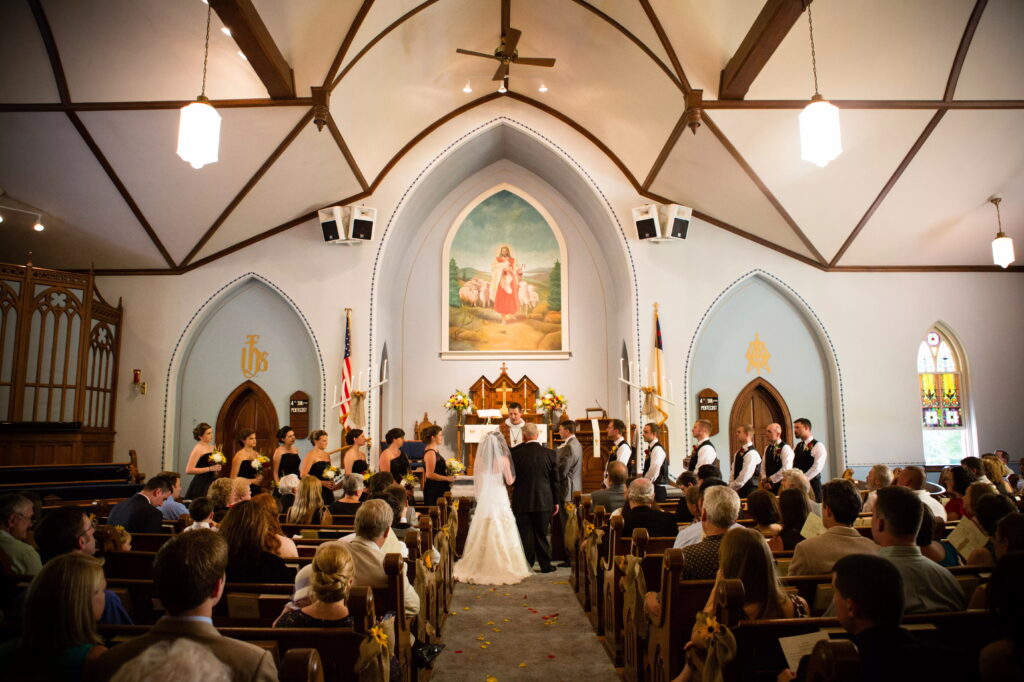Do you know the story of a wedding where several participants suddenly passed out?
The priest announced that one of the altar boys would read two verses from the Bible, the first of which was to be especially dedicated to the bride, and the second – to her chosen one.
The latter was never read, because as soon as the altar boy finished reading the first, there was a great commotion in the church. People fainted, screamed, and a few laughed hysterically.
The reason was as follows. The altar server had it written that he should read the verse marked “1 John 4:18.”
He thought it was one verse from the Gospel of John. He did not know that “1” changed its meaning from “John’s Gospel” to “First John” by the name of the book.
The difference was .. more than subtle.
He was to read:
There is no fear in love, but perfect love removes fear (1 John 4: 18a)
And he read:
For you have had five husbands, and the one you have now is not your husband. (John 4: 18a)

Okay, it was supposed to be a joke 😺but it was also supposed to illustrate what disregarding the context leads to. To understand any statement, spoken or written, you need to know its context.
The same word or sentence can mean the most recent things in different contexts. The verse about five husbands was not surprising in the context of Jesus’ conversation with the Samaritan woman in John chapter four, but it caused a panic about the wedding.
I have read seven million books on theology, religion and spirituality in my life. Maybe I’m exaggerating a bit. Top Six Million 😃Anyway – I have read many times how one confession spits on another, accusing him of his theology “taking verses out of context.”
I remember a somewhat primitive example, when one Church accused another of ripping verses out of context, and to illustrate that, they included a cheesy example that was supposed to be funny (I admit that I at the time I did consider it funny).
Throwing silver coins towards the sanctuary, he left, then went and hanged himself. Jesus said: Go, and do likewise! (Mt 27: 5 + Luke 10:37)
LET ME RIP SOMETHING OUT OF CONTEXT AS WELL
Let me do something similar, i.e. put two verses next to each other from completely different places in the Bible.
So God created man in his image, in the image of God he created him: male and female he created. (Genesis 1:27)
God created man in his image.
God is love. (1 John 4: 8b)
So what is man like?
Religion answers – man is a sinful worm, unworthy of being in God’s presence, and the fact that God keeps him alive at all is only due to the fact that God’s mercy is so great that… it is even greater than human abomination.
Today such words are hardly used anymore, most of the churches have revised their language for political correctness, but the theology has remained the same. If, as theology teaches me, eternity awaits me in hell, whether I am called only a “sinner” or “a hideous, unworthy sinner,” the meaning remains the same. There is something very wrong with me if I deserve eternity in a place of torture.
What makes sense to me is that if God created man in his image and likeness, and God is love, then man should also be…
LOVE?
Pure, perfect, perfect love?
That sounds like heresy, doesn’t it?
Now that we’re heretics, be .
Since God created man in his image and likeness, isn’t man, in short…
DIVINE?
If that sounds ridiculous to you, it probably sounded even more ridiculous to the “scribes,” or theologians of the time of Jesus. Not only absurdly, but blasphemously as well, with which they explained their repeated attempts to kill him.
Consider a rather rarely studied passage from the Gospel of John:
Jesus answered them, Is it not written in your law, I said, You are gods? If / Scripture / calls gods to those to whom the word of God was directed – and the Scripture cannot be rejected, then how do you say: You are blaspheming because I have said: I am the Son of God?
(John 10: 34-36)
Jesus quotes Psalm 82. This Psalm begins as follows:
God arises in the assembly of the gods, judges in the midst of the gods (Ps 82: 1)
In the original language we find the word that is most often used to describe God – Elohim , and is used three times, once in the singular, and twice in the plural. Interesting fact – it does not coincide with the translation, because the number of the word God is often used in a completely different way than in the English language.
God [ Elohim – plural] arises in the assembly of gods [ El – singular)], in the center of the gods [ Elohim] is judged (Ps 82: 1)
Only in the latter case do the grammatical number in Hebrew and English match. Elohim , in addition to the usual plural, is also used as the so-called majestic plural, used to honor someone in a stylistic way.
Psalm 82 is about “judges,” although the translation is misleading. The role of the judges was mainly military; perhaps a better translation would be “generals” rather than “judges”.
Nevertheless, it was about mere mortals who are surprisingly called… gods! I suspect that in the Middle Ages I would have been burned at the stake for simply studying this text😀
This looks squarely blasphemy!
But who is the author of this Psalm putting this blasphemy in his mouth?
God Himself.
It is God who calls people god / gods!
It seems to me that Jesus wants to cut the discussion of the term of titles as it is not beneficial for anyone to argue about words… After all, it is people who give words meaning, and we understand words based on our experiences and knowledge, which are different for every person… quarrel which word is blasphemy and which is not therefore makes no sense.
Even the term “blasphemy” is understood differently by everyone. However, if Jesus has not condemned any blasphemy anywhere, I suggest following His example!
Let’s go a little further in this crazy reasoning. Let me ask a seemingly stupid question.
Are children human?
This is a rhetorical question, but the idea behind it is, I think, worth rethinking.
A forty-year-old man with a doctorate who climbed Mount Everest, is an honorary blood donor and fluently speaks five languages, has a child who at first cannot even speak… Does anyone question the quality of this child? Does anyone say the child is inferior to its parent?
Nobody in their right mind and even a cursory knowledge of the world questions that the quality or nature of a person depends on his skills, health or skin color.
Is it not somewhat strange that religion paints a picture of man as someone quite different in character from that of his Father in Heaven, his Creator?
A human child is a human being, not some vile caricature of him.
So why does religion treat man so badly?
If you don’t know what’s going on, it’s about money.
Religion teaches us that we are worthless, sinful, and loathsome, and deserve the worst pits of hell, and our only chance of salvation lies in obeying religious commands and prohibitions.
Of course, they are often complex, contradictory or even impossible to implement… It is not the point, after all, for a man to come once and learn everything. It is important that he comes every Sunday and throws it on the tray.
Which version do you find more logical?
- God is love, and our Creator and Father, so we are dirty, sinful, unworthy even of His gaze.
- God is love, so we are too.
Most religious people will identify themselves with the first answer. And changing such thinking is… finding the right word is not easy here… because ordinary “difficult” is too banal… extremely, hellishly, extremely difficult.
Everyone brought up in religion, especially those who are devoted to religion, have a kind of PTSD (Post Traumatic Stress Disorder). If you are told from childhood that you are evil and sinful, it will be engraved in your consciousness very, very deeply. Like their parents’ children, who are often called stupid, they are very rarely successful in science.
Do you know the book by Robert Fulghum “All I Really Need To Know I Learned In Kindergarten“?
Its title carries a truth that developmental psychology has only learned in recent years:
Man’s worldview is formed in the first 6-7 years of life.
Of course, since the child lacks the ability to think abstractly, little is understood deeply, but the child has already entrenched in both consciousness and subconsciousness such issues as “are people good or bad?”, “Is this world friendly to me or not?” – and most importantly, “am I good or bad?”
Even when years later, a person rejects harmful religious dogmas, they can be so deeply imprinted in the mind that help, for example in the form of therapy or hypnosis, will be necessary, but the first step is to realize that as children of God we are like Him!
Not only beloved, not only accepted, but similar to HIM, just like children are like their parents!
Man, yes, is capable of doing enormous evil, but paradoxically, religion very often contributes to it – if we are told from the cradle that we are dirty, sinful and evil… won’t we behave like that?
For in him he chose us before the foundation of the world, to be holy and blameless before him (Eph. 1: 4)
We are holy and unblemished not because of what we do or do not do – otherwise we would lose this status and regain it every now and then, depending on what we have just done or thought, which is a total absurd! We are holy and blameless because we are God’s children!









